Randy Alcorn's Blog, page 4
September 17, 2025
Our Inability to Understand God’s Purposes in Suffering Should Not Surprise Us

Sometimes we make the foolish assumption that our heavenly Father has no right to insist that we trust Him unless He makes His infinite wisdom completely understandable to us. But if God offered us constant explanations for the circumstances we face, our lives would not be free or normal, and would not allow for faith or trust.
I think of my friend John Franklin, who was playing softball when he was then a healthy thirty-nine-year-old. John developed a headache and neck pain, so he took himself out of the game. By the time the game finished, he needed help walking.
Taken to the hospital, John became completely paralyzed and unable to speak. Soon he was breathing with a ventilator. John spent seven weeks in ICU and another four months in the hospital. He underwent speech therapy, then a few years of occupational and physical therapy. Now, many years later, John remains restricted to a wheelchair. Doctors never discovered why it happened.
John’s youngest son, six years old when his father became disabled, wrote me, “I remember always being so mad that God did this to him. One day I asked my dad why he wasn’t angry. He said, ‘Why should I accept good from God and not evil?’ I think my jaw dropped and at the time I was angry at him for saying that. But that experience has forever shaped my view of God and evil.”
This wonderful family has certainly seen God at work. But they still have no clear explanation of His purpose for John’s disability.
Consider what our lives would be like if God regularly explained to us why He allows everything that disappoints us.
Suppose you’re a teenage girl, sick on prom day. God could whisper, I let you get pneumonia so you wouldn’t bond with that young man who wouldn’t be right for you, and so your parents would go get you your favorite dessert, where they’ll see a help-wanted poster and tell you so you apply and get the job, and meet the girl who will become your best friend and help you twenty years from now when your husband gets cancer, and...
“Whoa! My husband? What’s he like? And why would you let him get cancer?”
In order to make you more Christlike and help you become more of a servant and...
“But I don’t want to be a servant. And cancer terrifies me!”
...and teach your husband to depend on me, and draw your children and grandchildren closer to you, and...
“I’ll have children and grandchildren? How many? Girls or boys? But how will they deal with their father’s cancer?”
Do you see where this is going? And it’s just one “simple” event. How could God explain His purposes without revealing to us the life He intends for us to live later, not now? And without imparting the grace that He will give us just when we need it, not in advance?
The God of providence weaves millions of details into our lives and into all the lives around us. Maybe He doesn’t have one big reason for bringing a certain person or success or failure or disease or accident into our lives; in fact, He may have hundreds of little reasons.
In order to understand God’s explanations, we would have to be God.
Recommended Reading
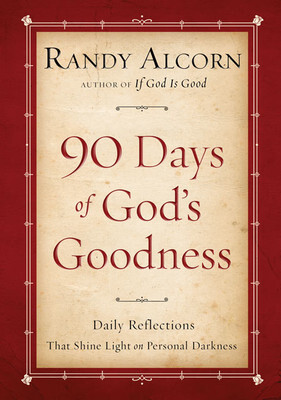 90 Days of God's Goodness
90 Days of God's Goodness  If God Is Good (Paperback)
If God Is Good (Paperback) 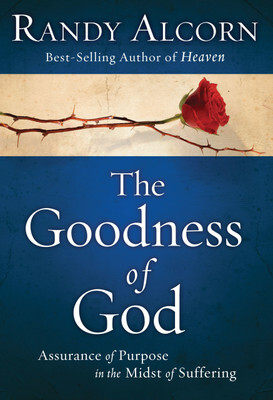 The Goodness of God
The Goodness of God
September 15, 2025
God’s Limits Are a Sign of His Power

In this YouTube short video, Sean McDowell explains that God’s limits are a sign of His power:
https://www.youtube.com/watch?v=RiHH_OEarF0
I love the way Sean McDowell thinks and communicates. When he spoke at our church, it was powerful, great for young and old alike. These are some supplementary thoughts that I would add to what he said in the video. Some of them make the same points, but I develop them differently and cite pertinent Scripture.
1. God cannot contradict His own character.
Second Timothy 2:13 tells us that “he cannot deny himself.” Luke 1:37 says with God, nothing is impossible.
Back in the 1970s when I was a brand-new Christian, it was popular for people to ask questions like, “Can God create a stone so heavy that He cannot lift it? If not, then He is not all powerful, and if so, He is not all powerful. Therefore, if it is impossible, that contradicts Scripture.” To some it seemed convincing, but it was just a ridiculous self-contradiction that proved nothing at all. If God is all powerful, then of course He cannot create a stone so large He cannot lift it. That doesn’t prove anything negative about God; it just affirms His attributes do not violate His own nature.
2. God cannot lie.
Hebrews 6:18 says, “It is impossible for God to lie.”
All human morality is properly derivative of the character of God. God is a truth teller; therefore, truth telling for humans is a virtue. As the embodiment of truth, God cannot deceive or contradict Himself. (It’s true that there are a few difficult passages related to God appearing to deceive people--one of those is sending a lying spirit to mislead Ahab, see this explanation.)
3. God cannot change.
In Malachi 3:6 God declares, “For I am Yahweh, I do not change.”
The classic theological doctrine of God's immutability means He does not and cannot change. His nature, purposes, and promises are therefore absolutely dependable. This is a source of comfort, because God’s faithfulness remains constant. Otherwise, He could love us today, but in the future stop loving us.
4. God cannot be tempted and cannot sin.
James 1:13 says God “cannot be tempted by evil.”
Because God is holy and righteous, He cannot act against His moral nature.
5. God cannot be unjust.
Hebrews 6:10 says “God is not unjust.”
Justice is an integral part of God's character, so He cannot act unjustly or unfairly. This does not, of course, mean that He will never appear to be unfair to us. But the problem is, we are both fallen and finite, so we are not always in a position to accurately judge God's own justice and fairness.
6. God cannot fail and cannot break His promises.
Luke 1:37 is a wonderful comfort: “For no word from God will ever fail.” And Numbers 23:19 says, “Has he spoken, and will he not do it? Has he promised, and will he not fulfill it?”
God's plans and purposes will ultimately succeed. His sovereignty ensures that nothing can thwart what He intends to accomplish.
That's why I totally agree with what Sean McDowell says in this clip. God's limitations are not weaknesses, but rather, expressions of His perfect nature.
Recommended Reading
 If God Is Good (Paperback)
If God Is Good (Paperback)
September 12, 2025
Charlie Kirk, the Brevity of Life, God’s Sovereignty, and Our Rock-Solid Hope

Like countless others, I was greatly saddened by the murder of 31-year-old Charlie Kirk, the founder and president of Turning Point USA, a few days ago. My prayers have been with his family and friends and church. Many of us have wept for their pain and suffering, and wept for our country as well.
I am very grateful Charlie expressed a genuine faith in Jesus. Here are a few direct quotes from him.
On his Instagram: “I believe in the Bible, and I believe that Christ rose from the dead on the third day. This is the foundation of my faith and guides my actions.”
In Charisma magazine: “Jesus Christ was God in human flesh. Who first and foremost taught us how to live and secondly and most importantly He was a gift to us; that if we accept Him as our Lord and Savior then we can have eternal life…”
Charlie’s Example of Respectful Disagreement through Dialogue
I want to make clear Charlie Kirk’s murder would have been a great tragedy, and arguably an even greater one, had Charlie not been a Christian (greater because he would not have gone to Jesus when he died). Regardless of his faith, had he been liberal instead of conservative, his assassination would have still been just as much an act of evil. True, in the prolife arena, which every reader of this blog knows is close to my heart, Charlie was a remarkably powerful spokesman to whom I said amen when I heard him talk about abortion. (If you don’t know who Charlie was, see for instance his respectful and logical dialogue with a prochoice young woman.)
I did not know Charlie Kirk personally, never met him, and didn’t listen to him often except in the prolife arena. Occasionally, I would watch clips on other subjects sent to me, and often admired his logic. Sometimes I heard him say something I did not agree with. But so what? Nothing unusual about that—I sometimes disagree with close friends and my spiritual leaders, and they disagree with me. I would've preferred that Charlie sometimes be more critical of our president in certain areas, and thought him doing so would have given him more credibility all those times he agreed with him. But, again, so what?
Charlie Kirk was a good man with earnest beliefs, who defended them with uncommon logic. He was a role model to college students across the country, not just telling them to speak up, but showing them how to speak the truth in love. He was also a brother in Christ, though of course many Christians sometimes disagreed with him, just as many disagree with me. This just comes with the territory, because free speech and open debate are fundamental to who we are as a country. It's one of our greatest strengths.
Charlie Kirk was a proponent of political discourse without the yelling and screaming and name-calling that is not only disturbing, but totally ineffective. I really appreciate that. In both national politics and the leadership of Christian churches and organizations, I believe leaders should be willing to challenge even their own friends and allies when necessary, but again only speaking the truth as they see it in a spirit of love.
In any case, the response to political conflicts should never be violence. Murder is never the answer to someone exercising free speech and publicly sharing their opinions. Murder should be regarded as 100% evil regardless of what areas we might disagree with someone in. I believe in the right to self-defense, yes, but assassination is not self-defense.
None of us is ever going to agree with anyone ALL the time (and if we do, it usually means we are not thinking for ourselves). But I did see clips where Charlie was exceptionally kind to those who openly and aggressively challenged him, which he invited them to do. He believed in open dialogue on points of disagreement, and in being logically consistent, and in not being defensive, and I loved that. (We should listen to those we disagree with because if we don’t, all we will have is dialogues of the deaf.) Charlie made clear to the young that they should love their country despite its flaws, and that they should labor to make it better. He showed them that they could stand up for their beliefs without a hard heart, hatred, and antagonism. That is something that not just the young but the old need to learn. Thank you, Charlie Kirk. And thank you, Jesus.
As followers of Jesus, none of us should blindly follow anyone. We follow King Jesus above all, and that will mean agreeing with some people often, but not always, and disagreeing with others often, but not always. And it means actually listening, then looking for common ground, which I remember Charlie Kirk doing in some of his dialogues I watched. He would say something like, “Let's establish first what we actually agree on.” May we all follow his example in doing this as we communicate both inside and outside our churches, and for that matter in our homes, in our marriages and as we raise our children.
The Death of a National Figure Impacts Us All
When texting with one of my grandsons about Charlie’s death a few hours after he was killed, I told him that I grew up with vivid memories of the assassination of President John F. Kennedy when I was in third grade. I remember where I was standing on a particular staircase at Orient Grade school when I heard the news. I sat with my mom and brother in front of the black and white TV, watching the news coverage for hours that turned into days. Fast forward five years to the spring of my eighth grade year at Orient, when Martin Luther King was assassinated.
Hours after King’s assassination, Bobby Kennedy set aside his prepared campaign speech at a political rally. The microphone caught him asking someone, “Do they know about Martin Luther King?” and when told they didn’t, he started by asking people to lower their signs. Then he said, “I have bad news for you, for all of our fellow citizens, and people who love peace all over the world, and that is that Martin Luther King was shot and killed tonight.”
Loud cries of shock followed, and many in the crowd wept. RFK said nothing political, nothing about his campaign, and spoke impromptu for less than six minutes to a stunned and mourning crowd, because human life is far more important than politics.
Kennedy’s next words were these: “In this difficult day, in this difficult time for the United States, it is perhaps well to ask what kind of a nation we are and what direction we want to move in.” This question applies to us in light of Charlie Kirk’s murder as well. (Kennedy’s entire five-minute speech that day is well worth watching.)
As a fourteen year old who had never heard the gospel and did not know God, I too wept over the murder of Martin Luther King. That spring, before the Oregon primaries, I was involved in Bobby Kennedy’s presidential campaign, going door to door passing out literature. Then, just two months after King was murdered, so was Bobby Kennedy. I was devastated. Bobby Kennedy was to me what Charlie Kirk was and is to many young people across our country, even many who disagreed with him but came to respect him.
As a young teenager who had no spiritual life, my head full of vivid memories of watching hours of the televised killings and related news and the funerals of JFK, MLK, and RFK, I was haunted by a sense of hopelessness. I knew the world was a mess, and in the next few years I would come to realize that I too was a mess, and was prompted to turn to Jesus.
That’s why I am especially sorry for the countless young people, believers and unbelievers alike, who followed Charlie Kirk. Many of them are now feeling exactly what I felt back in those days. You come to believe in and love certain public voices, and when they are killed, it’s like a part of you dies with them.
One of my grandsons, age 19, who appreciated Charlie Kirk, texted me hours after his death:
So awful for his family and our country. This is a dark time, and I pray things don't escalate to more violence. Sobering to know how awful a thing this killing is and yet to know that without Jesus we would all be going to the hell we deserve.
May We Number Our Days
While most people writing about Charlie Kirk’s murder are rightly focusing on the injustice and tragedy, I want to focus on something a bit different: the sobering reminder that none of us are promised we’ll be alive in this world tomorrow. (Because our loving God is in control, this is not fatalism.)
“No man has power over the wind to contain it; so no one has power over the day of his death” (Ecclesiastes 8:8). It is presumptuous to think otherwise. We often live under the illusion that our lives are in our hands. But God’s Word warns us otherwise:
“Now listen, you who say, ‘Today or tomorrow we will go to this or that city, spend a year there, carry on business and make money.’ Why, you do not even know what will happen tomorrow. What is your life? You are a mist that appears for a little while and then vanishes. Instead, you ought to say, ‘If it is the Lord’s will, we will live and do this or that.’ As it is, you boast and brag. All such boasting is evil” (James 4:13-16).
Our life on Earth is brief—“All men are like grass, and all their glory is like the flowers of the field; the grass withers and the flowers fall, but the word of our God stands forever” (Isaiah 40:6-8). Understanding this is the key to being wise rather than foolish. In the oldest psalm, Moses prayed, “Teach us to number our days aright, that we may gain a heart of wisdom” (Psalm 90:12).
It might seem that acknowledging we aren’t in control would raise our level of fear. But that’s not true. Recognizing God’s in control should allow us to relax, resting in His sovereignty. A spirit of fear and timidity is not from God (2 Timothy 1:7).
Corrie ten Boom said, “There are no 'if's' in God's world. And no places that are safer than other places. The center of His will is our only safety—let us pray that we may always know it!”
Our Hope in Jesus Is Unshakeable
In a time of dark suffering and dread, David affirmed,
The LORD is my light and my salvation—whom shall I fear? The LORD is the stronghold of my life—of whom shall I be afraid?... Though an army besiege me, my heart will not fear; though war break out against me, even then will I be confident.... Though my father and mother forsake me, the LORD will receive me.... I will see the goodness of the LORD in the land of the living. Wait for the LORD; be strong and take heart and wait for the LORD. (Psalm 27:1, 3, 10, 13–14)
The hope of God’s people shouldn’t be the illusion that we won’t suffer. Our hope should be in Jesus Christ, and that one day God will end our suffering (Revelation 21:4). Our hope should be in the fact that nothing in this world or outside it—no tragedies or accidents or terrorist attacks or anything else—shall separate us from the love of God in Christ Jesus (Romans 8:38-39).
To many of us, “hope” sounds wishful and tentative, but biblical hope means to anticipate with trust. We expect a sure thing, purchased on the Cross, accomplished and promised by an all-knowing God.
Ten years ago Nanci placed these words from Lamentations 3 on our bedroom wall. I still see them every day:
21Yet this I call to mind
and therefore I have hope:
22 Because of the Lord’s great love we are not consumed,
for his compassions never fail.
23 They are new every morning;
great is your faithfulness.
24 I say to myself, “The Lord is my portion;
therefore I will wait for him.”
25 The Lord is good to those whose hope is in him,
to the one who seeks him;
26 it is good to wait quietly
for the salvation of the Lord.
Hope points to the light at the end of life’s tunnel. It not only makes the tunnel endurable, it fills the heart with anticipation of a world alive, fresh, beautiful, without pain, suffering, terrorists or war. A world ruled by the only One worthy of ruling (see Revelation 5:12). Though we don’t know exactly when, we do know for sure that either by our deaths or by Christ’s return, our suffering will end. From before the beginning, God drew the line in eternity’s sand to say for His children, “This much and no more, then endless joy.”
In Tolkien’s Return of the King, Aragorn says, “Dawn is ever the hope of men.” King David wrote, “Weeping may last for the night, but a shout of joy comes in the morning” (Psalm 30:5, NASB).
The night may seem long for God’s people, but the truth is this: once it comes, the morning will never end.
Neither will the joy.
Recommended Reading
 In Light of Eternity
In Light of Eternity
September 10, 2025
Are You Weary in Life’s Race? Ask Your Savior for His Empowerment

Life in this world—the way it is now and the way we are now—can be difficult, can’t it? It’s easy to become burdened, discouraged, depressed, or even traumatized when you suffer the loss of a loved one, when your health is failing, or when your dreams—your family, career, or lifelong ambitions—have crumbled. Perhaps you’ve become cynical or have lost hope. Some seasons of life can seem like a series of twists, turns, and dead ends.
God gives each of us a race to run. To finish well we must develop perseverance. The Christian life is not a hundred-meter dash but a marathon, requiring patience, endurance, and discipline. But how do we find the strength to finish our race well?
Heaven Is Our Finish Line
When the apostle Paul faced hardship, beatings, and imprisonment, he said, “One thing I do: Forgetting what is behind and straining toward what is ahead, I press on toward the goal to win the prize for which God has called me heavenward in Christ Jesus” (Philippians 3:13-14, NIV). What gave Paul the strength and perspective to “press on toward the goal”? A clear view of Heaven.
A study was done in which one group of Israeli soldiers was told it would go on a march, but was not told if or when the march would eventually end. Another group was told the length of the march.
Both groups were tested for their stress response. Although they marched not one foot further than those in the other group, those who didn't know if or when the march would end registered a much higher level of stress. Why? Because they felt helpless—hopeless—wondering if they would ever be allowed to rest.
We do not know exactly when, but as followers of Christ, we do know there is a finish line. We will not run forever. We will rest.
Think of it: Jesus, at unfathomable cost to Himself, purchased for us a happy ending. A happy “ending” that will never end. Anticipating our future on a resurrected Earth with Christ can empower us to persevere in a difficult marriage, remain faithful to the hard task of caring for an ailing parent or child, or stick with a demanding job. Samuel Rutherford wrote, “Our little time of suffering is not worthy of our first night’s welcome home to Heaven.”
If you believe this, you won’t cling desperately to this life. Your solid hope will give you strength to persevere when things get tough. You’ll lift your face, stretch out your arms, and continue running in anticipation of the greater life to come. (I must mention suicide here because the idea seduces some people. The fact that Heaven will be so wonderful shouldn’t tempt us to take shortcuts to get to the finish line. As long as God keeps you here on Earth, it’s exactly where He wants you.)
Our Savior Is Waiting
Hebrews 12:1 tells us to “run with perseverance the race marked out for us,” creating the mental picture of the Greek competitions, which were watched intently by throngs of engrossed fans sitting high up in the ancient stadiums. The “great cloud of witnesses” refers to the saints who’ve gone before us, whose accomplishments on the playing field of life are now part of our rich history. The imagery may also suggest that those saints, the spiritual “athletes” of old, are now watching us and cheering us on from the great stadium of Heaven that looks down on the field of Earth.
The author of Hebrews goes on to admonish us to “fix our eyes on Jesus, the pioneer and perfecter of faith. For the joy set before him he endured the cross, scorning its shame, and sat down at the right hand of the throne of God.” The following verse commands us: “Consider him who endured such opposition from sinners, so that you will not grow weary and lose heart” (Hebrews 12:2–3, NIV).
John Piper writes of these verses, “But we do not look sideways to the saints as we run. Our main motivation comes from looking straight ahead at Jesus. He finished the same race of human life. Only he never sinned, and so his race was perfect. When he finished his race, he finished our salvation. So we run, ‘looking to Jesus, the founder and finisher of our faith.’”
Jesus Christ, the Rock of salvation, is the One who has promised to prepare a place for those who put their hope in Him, a place where they will live with Him forever. If we can learn to fix our eyes on Jesus, to picture our eternal home in our mind’s eye, it will comfort and energize us, giving us a clear look at the finish line. And if we’ve served Him here, His welcome will be glorious!
In his book Things Unseen, Mark Buchanan describes the Christian’s life race and Jesus’ role encouraging us on: “You’re heaven-bent. You eagerly await a Savior who, in turn, eagerly awaits you. There’s a huge company with you, cheering every move you and your Savior make closer to each other. He pours out grace for you to finish the race. He pours out more grace when you stumble, grow weary, fall down, lose heart. He stands at the head of the course and, while all the saints who have gone before line the roadway and cheer riotously, He stretches out His arms wide in exuberant welcome, exultant congratulation.”
I imagine myself seeing Jesus, falling to my knees, having Him reach out and pull me up. To think of Him welcoming me not just once, but for all eternity, is sheer joy.
Shut your eyes and picture seeing Jesus and being embraced in His arms when you cross life’s finish line. What a wondrous thought!
The Promise of Eternal Reward
It’s not only the anticipation of seeing our Savior that should propel us forward; it’s also the joy of pleasing Him. Jesus has promised reward for those who’ve faithfully served Him: “Behold, I am coming soon, bringing my recompense with me, to repay each one for what he has done” (Revelation 22:12).
Moses remained faithful to God because “he was looking ahead to his reward” (Hebrews 11:26, NIV). Likewise, Paul ran his race with his eyes on Heaven’s prize, which motivated him to run hard and long. He was unashamedly motivated by the prospect of eternal reward, and acknowledged it freely and frequently (1 Corinthians 9:24-25; 2 Corinthians 4:16-18; 5:9-10; 2 Timothy 4:7-8). “Run in such a way as to get the prize,” he said, and on the verge of death he spoke longingly of the crown the Judge would award him in Heaven. He encouraged believers with these words: “Let us not become weary in doing good, for at the proper time we will reap a harvest if we do not give up” (Galatians 6:9).
Jesus tells us that one day His faithful servants will hear their Master say, “Well done, good and faithful servant. You have been faithful over a little; I will set you over much. Enter into the joy of your master” (Matthew 25:23).
Think about those incredible words: “Well done, good and faithful servant.” Memorize them. They are the words we long to hear, the words we were made to hear.
What changes might you need to initiate today so that you may one day hear those words from God? If you don’t yet know Jesus, it’s not too late. Confess your sins and humbly accept the gift of His atoning sacrifice on your behalf. If you do know Him, make your daily decisions in light of your destiny. By God’s grace, use the time you have left on the present Earth to store up for yourself treasures on the New Earth, to be laid at Christ’s feet for His glory (Revelation 4:10). Run your race of life to honor Him.
And should you wonder if there’s anything you’ve done that God could possibly reward, be encouraged by 1 Corinthians 4:5 which talks of the judgment when “each will receive his praise from God” (NIV). He will find something to reward you for. Will you seek to do more rewardable works for Him?
When we hear Jesus say “Well done,” we'll know that any sacrifice we made, any difficulty along the way, was nothing. Meanwhile, we can rejoice in suffering in the same way that Olympic athletes rejoice in their workouts—not because we find it easy, but because we know it will one day result in great reward.
He Gives Renewed Strength
Many are familiar with the beautiful promise of Isaiah 40:31: “Those who hope in the LORD will renew their strength. They will soar on wings like eagles; they will run and not grow weary, they will walk and not be faint” (NIV).
Joni Eareckson Tada writes about this verse:
The beginning of the Christian life was exhilarating: lots of smiles and handshakes and encouragement. Your emotions soared. And the end? Well, it’s going to be wonderful meeting Jesus face-to-face.
But now you’re in the middle. There are miles behind you and miles to go. You don’t hear any cheers or applause. Your commitment to simply keep putting one tired foot in front of the other begins to flag and fade. Ah, but the promise in Isaiah is just as true now as then. Friend, if you walk in the Spirit, your strength will be renewed. You’ll run and not be weary. Even in the long, gray, middle distance, you will walk and not be faint. So friend, don’t faint; don’t give up. The finish line is just over the horizon and, oh, what a rich reward awaits you. Every step brings you closer to home, so fix your eyes on the One who awaits you there. You’re halfway home.
With God’s help, we can submit to the discipline of the life circumstances He’s entrusted to us. May we rejoice not merely when those circumstances please us, but even when they don’t, because we know God is sovereign, all-knowing, and all-wise, because He has delivered us from Hell and promised us Heaven, because He is working together all things, even the worst things, for our good (Romans 8:28).
So are you weary in life’s race? Ask your Savior for His empowerment to finish strong, and keep your eyes on the heavenly finish line. By His sustaining grace, you’ll make it.
Recommended Reading
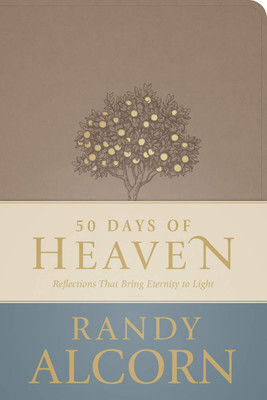 50 Days of Heaven (Special Edition)
50 Days of Heaven (Special Edition)  90 Days of God's Goodness
90 Days of God's Goodness 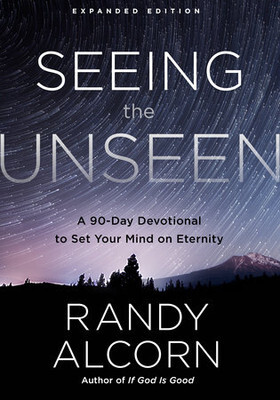 Seeing the Unseen, Expanded Edition
Seeing the Unseen, Expanded Edition
September 8, 2025
Fearing God Drives Away Other Fears

Writing on Psalm 23:4 (“I will fear no evil, for you are with me; your rod and your staff, they comfort me”), Charles Spurgeon said these wonderful words:
The worst evils of life are those which do not exist except in our imagination. If we had no troubles but real troubles, we should not have a tenth part of our present sorrows. We feel a thousand deaths in fearing one, but the Psalmist was cured of the disease of fearing. “I will fear no evil,” not even the Evil One himself; I will not dread the last enemy, I will look upon him as a conquered foe, an enemy to be destroyed, “For you are with me.”
This is the joy of the Christian! “You are with me.” The little child out at sea in the storm is not frightened like all the other passengers on board the vessel, it is asleep in its mother’s bosom; it is enough for it that its mother is with it; and it should be enough for the believer to know that Christ is with him. “You are with me; I have in having thee, all that I can crave: I have perfect comfort and absolute security, for you art with me.” “Your rod and your staff,” by which thou governest and rulest thy flock, the ensigns of thy sovereignty and of thy gracious care—“they comfort me.” I will believe that thou reignest still. The rod of Jesse shall still be over me as the sovereign succour [help/support] of my soul.
My wife Nanci wrote in her journal a prayer based on Psalm 23 that included these thoughts about fear related to her stage-four cancer:
May your Holy Spirit—the Comforter—banish all my fears of evil (being out of control, letting pride inflate me, weakness, pain, loss of plans) as I walk through this valley—because you are with me!
Scripture is full of commands to fear God, and it is also full of commands to not be afraid. If we fear God, we need not be afraid of anyone or anything else. John Donne wrote, “As he that fears God, fears nothing else. So he that sees God, sees everything else.” Similarly, in Grow in Grace, Sinclair Ferguson writes, “The fear of the Lord tends to take away all other fears… This is the secret of Christian courage and boldness.”
If we don’t fear God, we have good reason to be afraid of other things. You fear God when you come to grips with the fact that He is in charge, and you are not. As Spurgeon put it, He is the sovereign help of our souls.
Yet despite being the sovereign King over all, He’s also near His children and cares deeply for them. “Cast all your anxiety on him because he cares for you” (1 Peter 5:7). God, the Creator of the universe and fountainhead of all marvels, cares for you and me! Here’s another great Spurgeon quote: “God has never refused to bear your burdens, he has never fainted under their weight.”
In Psalm 16:8 David says, “I have set the LORD always before me. Because he is at my right hand, I will not be shaken.” To set the Lord before me is to recognize His presence and His constant help. May we do the same.
Recommended Reading
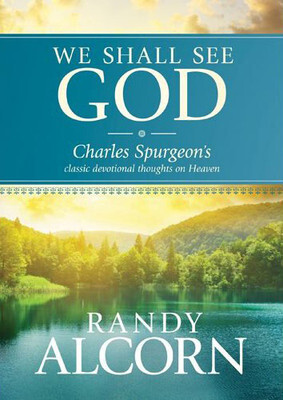 We Shall See God
We Shall See God
September 5, 2025
Is Being Pro-Life Really Just “Pro-Forced Birth”?

Note from Randy: Abortion involves the life of a person and therefore becomes the concern of a decent society. Just as society would protect the life of the mother if someone tried to kill her, so it should protect the life of the child if someone tries to kill her. “Forcing” a woman to continue a pregnancy, which is a natural function of her body, is not barbaric or primitive, nor is it about pro-lifers exerting control over women’s bodies, as some claim. It’s simply protecting the life of a woman’s unborn child, even if she feels her pregnancy is a burden.
And given that abortion harms women both physically and mentally, it’s protecting her, too, though she may not immediately see it as such. In time, she will likely come to understand that her temporary burden was well worth it to know that her child was rescued from death, and now has a life to live. What’s truly barbaric and primitive is unnaturally ending the life of a helpless baby in her mother’s womb, which should be the safest place for a child.
In this article, Tim Barnett with Stand to Reason answers the claim that being prolife is just “pro-forced birth.” And I hope you’ll consider downloading a free copy of my book Pro-Choice or Pro-Life?, which will equip you to have pro-life conversations with others.
Are Pro-Lifers Just “Pro-Forced Birth?”
Words matter.
They’ve been used to rally troops and comfort widows as well as incite violence and intimidate opposition. Words inspire and illuminate, but they also deceive and distort. Words are powerful.
When it comes to moral issues, the stakes are high. Words can be used to either reveal or conceal evil. Someone once said, “When words lose their meaning, people lose their lives.” This dictum is no more obvious than in the abortion debate.
Abortion advocates are brilliant at playing word games. Using clever rhetorical moves, they are able to make protecting preborn children look bad and killing preborn children look good. Here’s an example.
More and more abortion proponents are referring to their opponents as “pro-forced birth” or “forced-birth extremists.” This label is designed to deceive by focusing on two words: force and birth. First, they want you to think pro-lifers are the ones using force. After all, they claim, pro-life people are taking away pregnant women’s freedom by forcing them to carry a child. On this view, pro-choice means pro-freedom and pro-life means pro-force. Second, they want you to think pro-lifers are merely pro-birth. That is, they only care about unborn humans until they’re born. After birth, they don’t matter.
The Good Place actress Jameela Jamil employed this rhetoric in a recent Instagram post. She wrote,
Not pro-life. Pro forced birth. That’s the correct terminology for anyone who discards the life, health, mental well-being, survival and freedom of the living… for the unborn. Who they will then equally disregard the human rights of once born.
This post has over 230,000 likes. That means a lot of people are persuaded by this use of language. But it’s all smoke and mirrors. Let me show you.
Deceptive Terminology Twists Truth
First, notice how this characterizes pro-life proponents as “forcing” something (i.e. birth) on pregnant women against their will. This is not a coincidence. It’s by design. One cannot help but think of other horrific examples of forcing people to do things against their will. Forcing a woman to have sex against her will. Forcing a man to work for you against his will. Forcing a child away from her family against her will.
When abortion advocates use the words “pro-forced birth,” they want you see a parallel to “pro-forced sex” or “pro-forced slavery.” This deceptive rhetoric tries to manipulate people into calling good evil and evil good. Unfortunately, it seems to be working.
In reality, pro-lifers aren’t forcing women to do something. Rather, they are telling them not to do something (i.e., do not kill another human being). This might be better described as restraining evil by threat of punishment.
We do this all the time, by the way. What pro-lifers are advocating here is nothing more than what ordinary people advocate when they restrict behavior that endangers the lives of other humans. For example, nobody seriously complains about being restricted to 25 miles per hour in a school zone with kids all around. People don’t protest because this restriction protects the lives of innocent children.
Calling someone “pro-forced birth” is a lot like calling someone “pro-forced speed limit in a school zone.” Both want to restrict acts that bring harm to innocent humans—whether unborn or born.
So, first, abortion advocates use the language of “force” to twist truth. This rhetoric makes it sound like pro-lifers are the ones doing something wrong—forcibly causing some wicked act against pregnant women. The truth is just the opposite. They are trying to prevent a wicked act—the forced killing of an innocent human being. This leads to my next point.
Who’s Really Forcing?
Second, abortion is the “force” option—literally, pro-forced death. Let me explain.
“Pro-forced birth” is an inappropriate way to describe pro-lifers—those trying to prevent the killing of unborn human beings. But it’s also a strange way of characterizing birth. After all, birth is a natural consequence of a natural process. The result of an uninterrupted, healthy pregnancy is childbirth. No external force necessary.
Abortion, on the other hand, is the use of deadly force—an unnatural intrusion of lethal force against an innocent human being into the very space perfectly designed for the baby’s safe, natural development. Forcing a flood of poisonous fluid into a woman’s uterus to chemically burn a baby to death. Forcing a sharp scalpel into the brain of an innocent child and dismembering her in utero, then forcing forceps to remove her body parts piece by piece.
Every elective abortion uses deadly force to kill a human being. Every successful abortion ends with a dead human. Thus, abortion is pro-forced death. And that’s not rhetoric. That’s fact.
Isn’t it interesting, then, how proponents of the “pro-forced death” position try to saddle pro-lifers with the manipulative language of “force”?
However, once we pull back the veil on the rhetorical game that’s being played, we can clearly see what’s really going on.
Merely “Pro-Birth”?
One more thing. Some lies are repeated so often, people uncritically accept them as true.
Abortion advocates often describe pro-lifers as only caring about humans before birth but not after. This is demonstrably false. Pro-life people around the world are actively involved in efforts to help the sick, feed the hungry, clothe the naked, build orphanages, fight sex trafficking, and all kinds of other humanitarian work.
And, for the record, there are more nonprofit, pro-life crisis pregnancy centers in this country—funded by the generous financial gifts and unpaid volunteer help of pro-lifers—than there are for-profit, abortion centers—funded by fees gathered from killing unborn humans and from tax dollars.
So, pro-lifers aren’t “pro-force,” and they aren’t merely “pro-birth.” And they certainly aren’t “pro-forced birth.” This is a deceptive language.
When it comes to moral issues, like abortion, we must always be alert for the word games, rhetorical ploys, and manipulative language that distort the truth and make something evil look good.
Originally published at Stand to Reason. Reprinted with permission.
Recommended Reading
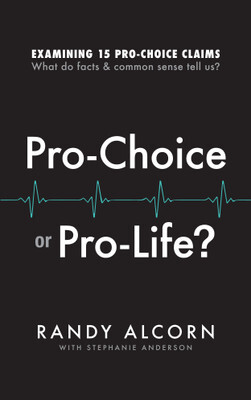 Pro-Choice or Pro-Life?
Pro-Choice or Pro-Life? 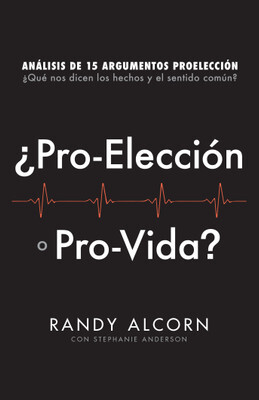 ¿Proelección o Provida? (Pro-Choice or Pro-Life? in Spanish)
¿Proelección o Provida? (Pro-Choice or Pro-Life? in Spanish)
September 3, 2025
That Time J. I. Packer Read from the Heaven Book

Almost five years ago, J. I. Packer, one of my favorite writers and favorite people, went to be with Jesus. There are many people I respect, but not many I’m in awe of. Dr. Packer is one of them. My life first as a child of God, and then as a pastor and writer, has been deeply affected by him.
When his book Knowing God came out in 1973, I was a young Christian. God used it in my life profoundly. It is still one of my top five books of all time. If you haven’t read it, order it now and get ready for a treat, and then read anything and everything by J. I. Packer. I have benefited greatly from Evangelism and the Sovereignty of God, and years later God spoke to me through Keep in Step with the Spirit. My love for the Puritans deepened when reading A Quest for Godliness. I have profited too from his Shorter Writings and in speaking against the health and wealth gospel I have quoted from his unlikely named Hot Tub Religion. But start with Knowing God. (You can read chapter one here.)
Back in 2009, I was asked to be on a panel on Heaven and Hell at a book conference. When I asked who else would be on the panel, they mentioned J. I. Packer, and my response was, “I will do it as long as I can sit next to Dr. Packer.” (The organizers kindly accommodated my request!)
Thirty-six years after reading Knowing God as a teenager, it was surreal to be chatting and drinking Starbucks and hanging out with Dr. Packer before the panel started. In fact, as we talked, J. I. mentioned that he hadn’t had time to get coffee with his breakfast. Nanci quickly and cheerfully offered to get him a drink from Starbucks. With a twinkle in her eye, she told me later, “I got coffee for J. I. Packer!”
That time with him was great, but what really left me speechless was that during the panel discussion, J. I. reached in his briefcase and pulled out my big Heaven book and read from it! And not because he disagreed, which was initially the only reason I could think of for him referring to it.
J. I. Packer pulling out my Heaven book was REALLY too much. Then when he made a nice comment about my book, I dropped my face into my hands, and people started laughing. Later, looking over his shoulder, I could see the book was worn and he had marked it up. Knowing Dr. Packer had written about the great Puritan Richard Baxter, I was amazed and touched that he said my book was for the current time what Richard Baxter’s The Saints Everlasting Rest was in the seventeenth century. This was typical of his kindness and graciousness that encouraged so many of us.
At one point later in the panel discussion Dr. Packer answered a question, then leaned over and looked at me sincerely, whispering, “Do you think that was right?”
What I thought was, “You are J. I. Packer. I am an idiot.” What I said, nodding my head too emphatically, was “Yes.”
Here's the clip of J. I. reading that Richard Baxter quote:
https://www.youtube.com/watch?v=1GJIcDmk-Rs?si=4H9nSJT1n683lp7G
This is the text of the Baxter quote he read:
If there be so certain and glorious a rest for the saints, why is there no more industrious seeking after it? One would think, if a man did but once hear of such unspeakable glory to be obtained, and believed what he heard to be true, he should be transported with the vehemency of his desire after it, and should almost forget to eat and drink, and should care for nothing else, and speak of and inquire after nothing else, but how to get this treasure. And yet people who hear of it daily, and profess to believe it as a fundamental article of their faith, do as little mind it, or labour for it, as if they had never heard of any such thing, or did not believe one word they hear.
Recommended Reading
 50 Days of Heaven (Special Edition)
50 Days of Heaven (Special Edition) 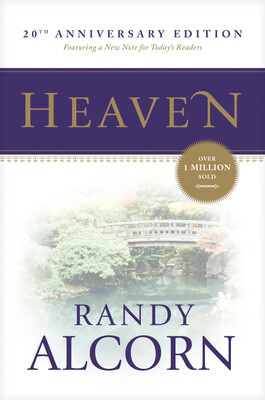 Heaven
Heaven 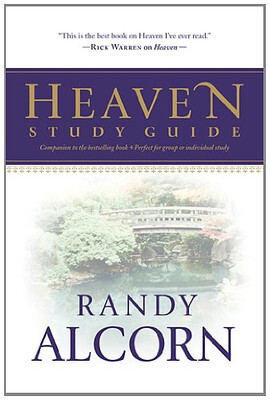 Heaven Study Guide
Heaven Study Guide
September 1, 2025
These Seven Biblical Truths Can Bring You Great Happiness

In my last blog, I shared six false expectations that can diminish our happiness. So what truths should raise our expectations of happiness? Here are seven worth focusing on:
1. God’s Immeasurable Love for Us
In Ephesians, Paul prays that the recipients of his letter may “have strength to comprehend with all the saints what is the breadth and length and height and depth, and to know the love of Christ that surpasses knowledge, that you may be filled with all the fullness of God” (Ephesians 3:18-19).
He ends the chapter saying, “To him who is able to do far more abundantly than all that we ask or think, according to the power at work within us, to him be glory in the church and in Christ Jesus throughout all generations, forever and ever” (Ephesians 3:20-21).
After reading this inspired text, how great should our expectations of God be?
2. God’s Willingness to Completely Forgive Us Whenever We Confess Our Sins
Ironically, it’s easier to be restored to a positive relationship with God than with any other being. As difficult as this is to grasp, when we do, it’s happy-making in the extreme.
God is the holiest being in the universe, meaning that His standards are infinitely higher than any creature’s. It would be easy to conclude, then, that God would be more prone than anyone else to hold our offenses against us. Yet the opposite is true. “If we confess our sins, he is faithful and just to forgive us our sins and to cleanse us from all unrighteousness” (1 John 1:9). Who else will forgive us of everything, absolutely and every time—even when we’ve deeply hurt them?
It’s not the sinless God but sinful people who sometimes refuse to forgive us—just as we are sometimes slow to forgive.
Nothing we’ve done or can ever do will surprise God or cause Him to change His mind about us. No skeletons will fall out of our closets in eternity. He has seen us at our worst and still loves us. Arms wide open, He invites our confession and repentance, which He always meets with His grace and forgiveness.
How secure are we in God’s love? Jesus said, “My sheep hear my voice, and I know them, and they follow me. I give them eternal life, and they will never perish, and no one will snatch them out of my hand” (John 10:27-28).
3. God’s Constant Presence in Us and with Us
Matthew Henry said, “Happy are those who have the Lord for their God, for they have a God that they cannot be robbed of. Enemies may steal our goods, but not our God.”
Joshua 1:9 offers this encouragement: “The Lord your God is with you wherever you go.” Jesus promised His disciples, “I am with you always” (Matthew 28:20). Here is a source of both comfort and courage: “Fear not, for I am with you; be not dismayed, for I am your God; I will strengthen you, I will help you, I will uphold you with my righteous right hand” (Isaiah 41:10).
Our happiness is largely determined by who or what we depend on. If we depend on God, we’ll be happy because God is always with us: “God’s Spirit dwells in you” (1 Corinthians 3:16). Of course, sometimes we’ll sense His presence more than other times. But He is there for us when life is dry, stressful, or traumatic, helping us and even praying for us: “The Spirit helps us in our weakness. . . . The Spirit himself intercedes for us with groanings too deep for words” (Romans 8:26).
The stories of many prisoners—including Corrie ten Boom, Richard Wurmbrand, and Aleksandr Solzhenitsyn—document that they survived imprisonment and torture because God’s supernatural indwelling presence was their lifeline. We who know Jesus have the same.
“God has said, ‘Never will I leave you; never will I forsake you’” (Hebrews 13:5, NIV). Such a promise offers us happiness in the most difficult times and places.
4. The Transforming Power of God’s Word
Never underestimate the life-changing nature of God’s inspired Word: “All Scripture is inspired by God and is useful to teach us what is true and to make us realize what is wrong in our lives. It corrects us when we are wrong and teaches us to do what is right. God uses it to prepare and equip his people to do every good work” (2 Timothy 3:16-17, NLT). Meditating on Scripture, which God uses to make us more like Christ, is a powerful source of personal happiness.
God promises that His Word “will not return to me empty, but will accomplish what I desire and achieve the purpose for which I sent it” (Isaiah 55:11). He does not promise that about OUR words, but HIS. If we want our words to have lasting value and impact, they need to be touched and shaped by His words—and that won’t happen without a daily choice to expose our minds to Scripture.
5. The Sufficiency of Christ’s Work on Our Behalf
When Jesus said “it is finished” John 19:30), he used the Greek word teleo, which was commonly written over certificates of debt once they were fully paid. It means “nothing more is owed; there is no more debt to be paid.” It’s not that Christ took on 99% of our sin and guilt and we must carry the other 1%. It’s that He took it all on.
Consider this promise: “[God’s] divine power has granted to us all things that pertain to life and godliness” (2 Peter 1:3). We’re also told that God has “blessed us in Christ with every spiritual blessing in the heavenly places” (Ephesians 1:3). We can rejoice knowing that Christ has already provided all we need for salvation and eternal happiness.
6. The Providence of God and His Sovereign Purpose in Our Lives
We can be confident knowing that God is in control of the details of our lives: “Yours, O Lord, is the greatness and the power and the glory and the victory and the majesty, for all that is in the heavens and in the earth is yours. Yours is the kingdom, O Lord, and you are exalted as head above all. Both riches and honor come from you, and you rule over all. In your hand are power and might, and in your hand it is to make great and to give strength to all” (1 Chronicles 29:11-12).
God pays a great deal of attention to the “little things.” He numbers the hairs on our heads and cares for the lilies of the field. Jesus said, “Are not two sparrows sold for a penny? And not one of them will fall to the ground apart from your Father. But even the hairs of your head are all numbered. Fear not, therefore; you are of more value than many sparrows” (Matthew 10:29-31).
Our fates do not rest in the hands of fallen humankind: politicians, lawyers, military officers, employers, or even spouses and children. No matter what happens, and how much it hurts, God is fully capable of using painful events for good.
7. The Undiluted and Eternal Happiness That Awaits Us
“You have endowed him with eternal blessings and given him the joy of your presence” (Psalm 21:6, NLT). “And the ransomed of the LORD shall return and come to Zion with singing; everlasting joy shall be upon their heads; they shall obtain gladness and joy, and sorrow and sighing shall flee away” (Isaiah 51:11).
Jonathan Edwards wrote, “After they have had the pleasure of beholding the face of God millions of ages, it will not grow a dull story; the relish of this delight will be as exquisite as ever.”
Undiminished happiness is promised us—what other king has ever promised his people anything so great? And what other king has undergone for his subjects the ultimate sacrifice to fulfill that promise?
Recommended Reading
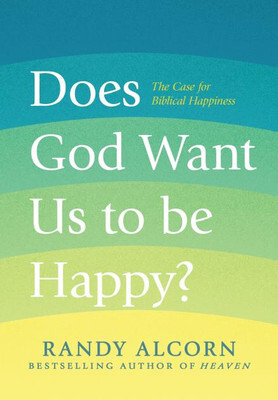 Does God Want Us to Be Happy?
Does God Want Us to Be Happy?  God's Promise of Happiness
God's Promise of Happiness  Happiness (softcover)
Happiness (softcover)
August 29, 2025
Are Any of These Six False Expectations Diminishing Your Happiness?

Most people intuitively know that our expectations profoundly affect our life experiences. Yet even as believers, we simultaneously expect too much and too little. We need to discover what we should expect less of and what merits higher expectations. That involves lowering our expectations concerning all the advantages we think life should bring us while raising our expectations concerning Christ and what He is daily accomplishing in us.
Here are six false expectations—those that are not grounded in Scripture and undermine our happiness:
1. God’s Love for Us Should Look Just Like What We Want
God has promised us His undying love, but we often imagine how we’d do things differently for those we loved if we were all powerful. We’d surely keep anything bad from ever happening to them, right? That may be our understanding of love, but it’s not God’s.
If we ignore countless passages that promise us persecution and suffering while focusing on those that promise us God’s blessing, we lose sight of His promise to discipline us, build our character, and increase our Christlikeness through suffering.
We ought to expect with the highest confidence only what God has clearly, fundamentally, and absolutely promised. And if our gratitude is lessened with such an understanding, the problem is our expectations, not God’s promises. If we expect God to make our lives easy, our expectations are unbiblical.
2. We Won’t Be Persecuted for Our Faith
Jesus said, “If the world hates you, keep in mind that it hated me first” (John 15:18, NIV). Peter said we should be firm in our faith, “knowing that the same kinds of suffering are being experienced by your brotherhood throughout the world” (1 Peter 5:9).
In spite of multiple promises of suffering throughout Scripture, many Christians seem shocked or outraged when they have to face these trials. Americans have been slow to accept the extent to which Bible-believing Christ-followers have become socially unacceptable. Though we should work to hold on to our religious liberties, it’s likely they’ll continue to erode. But cheer up! Opposition is nothing new for God’s people, and historically the church’s greatest advances have come at the lowest ebb of its popularity.
The Christian faith may never return to its central public role in our culture, but Christ’s gospel is bigger than every obstacle. Sometimes a less popular church becomes a more faithful, dynamic, and joyful church. Any church whose happiness hinges on its popularity will either compromise its integrity or surrender its happiness—in either case failing to show the world the true and joyful gospel of Jesus.
3. Jesus Must Return in Our Lifetime
“Stay awake, for you do not know on what day your Lord is coming. . . . Be ready, for the Son of Man is coming at an hour you do not expect” (Matthew 24:42, 44).
Christ will surely return, just as He promised (see Luke 21:27). Since the beginning of church history, many believers have thought Christ would return in their lifetimes. So far, everyone who has died in the past two thousand years has been wrong in that expectation.
In recent years, I’ve often heard believers say, “Christ has to return within the next few years.” No, He doesn’t. He may, but He may not return for decades or centuries. That’s entirely up to Him. Meanwhile, it’s up to us to continue living for Him.
4. Life Will Go Smoothly and We’ll Always Have Health and Wealth
Scott Peck opens The Road Less Traveled, “Life is difficult. . . . Once we truly know that life is difficult—once we truly understand and accept it—then life is no longer difficult.” Well, it’s less difficult, anyway!
Paul said, “We brought nothing into the world, and we cannot take anything out of the world. But if we have food and clothing, with these we will be content” (1 Timothy 6:7-8). Food and clothing may seem like low expectations. By the standards of the health-and-wealth gospel, these expectations are dismally low, but they’re accompanied by dramatically high expectations of God, who gives us riches in Heaven. After all, He’s the source of our joy!
Has God promised to make us healthy and wealthy? No, not in this life—only in the resurrected life on the New Earth.
5. Life Will Be Fair and People Will Treat Us Kindly and Thoughtfully
Jesus said, “If you lend to those from whom you expect to receive, what credit is that to you? . . . But love your enemies, and do good, and lend, expecting nothing in return, and your reward will be great” (Luke 6:34-35).
All Bible passages about forgiveness involve lowering our expectations of people and not insisting they live up to our standards, or demanding perfection we don’t measure up to ourselves. God’s grace should calm us and cheer us.
If my saying, “Cheer up” seems naive, someone else—Jesus—said it first: “I have told you this, so that you might have peace in your hearts because of me. While you are in the world, you will have to suffer. But cheer up! I have defeated the world” (John 16:33, CEV).
6. Churches Owe Us Better Treatment than We’ve Received
I am sadly aware that churches have contributed to much unhappiness. But when our expectations of church people, and especially pastors, are inordinately high, we become deeply disappointed, thinking that Christians should know better and have no business being imperfect (often not realizing how imperfect we ourselves are and that the problem with church people is often that they are too much like us).
Scripture tells us we shouldn’t be “neglecting to meet together, as is the habit of some,” but should gather together, “encouraging one another” (Hebrews 10:25). When we back away from the local church, we often engage in spiritual isolation that’s likely to not only distance us from God’s work but also sour us and our children to the great good churches are doing.
We need to fix our eyes on Jesus, raise our expectations of our personal need to obey Him by being part of and serving the church, and lower our expectations of others so we’ll be more understanding and forgiving. Sometimes we need to find another church that teaches God’s Word and centers on Jesus. He sees all the flaws in the church, but He hasn’t given up on His bride, and He won’t (see Matthew 16:18). Neither should we.
Recommended Reading
 God's Promise of Happiness
God's Promise of Happiness  Happiness (softcover)
Happiness (softcover) 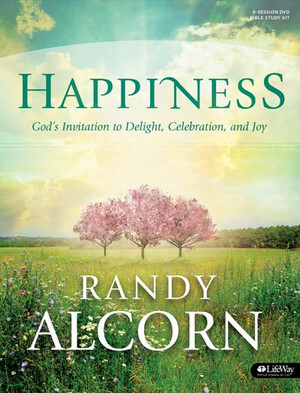 Happiness Leader Kit
Happiness Leader Kit
August 27, 2025
Will Our Earthly Marriage Partners Still Be Important to Us in Heaven?

One of the most frequent questions I’ve been asked about Heaven is about the nature of marriage there. As I share in my book Heaven, there will be one marriage in Heaven, not many. That marriage will be what earthly marriage symbolized and pointed to, the marriage of Christ to His bride. So we will all be married—but to Christ.
Our marriage to Him is the true Marriage, of which the best of earthly marriages was a symbol and shadow. Those who did not experience marriage or had only a poor marriage on earth will be delighted with their eternal Bridegroom, who has already gone to prepare a place for them. One day all Heaven will attend the ultimate wedding, and we will be His bride (see Revelation 19:7-9).
However, I do envision that people who’ve had important roles in each other’s lives will continue to be friends—and that would include a lot of people who’ve been married. Although married couples’ relationships will look different in Heaven, that certainly doesn’t mean that earthly marriage is unimportant. God uses it in our lives in profound ways!
Jesus said the institution of human marriage would end, having fulfilled its purpose. But He never hinted that deep relationships between married people would end.
Here on Earth we long for a perfect marriage. That’s exactly what we’ll have—a perfect marriage with Christ. Nanci is not only my wife, but also my best friend and my closest sister in Christ. Will we become more distant in the new world? Of course not—we’ll become closer, I’m convinced. The God who said, “It is not good for the man to be alone” (Genesis 2:18) is the giver and blesser of our relationships.
Life on this earth matters. What we do here touches strings that reverberate for all eternity. Nothing will take away from the fact that Nanci and I were marriage partners here and that we invested so much of our lives in each other, serving Christ together.
In their book The Meaning of Marriage, Tim and Kathy Keller write:
What, then, is marriage for? It is for helping each other to become our future glory-selves, the new creations that God will eventually make us. The common horizon husband and wife look toward is the Throne, and the holy, spotless, and blameless nature we will have. I can think of no more powerful common horizon than that, and that is why putting a Christian friendship at the heart of a marriage relationship can lift it to a level that no other vision for marriage approaches.
Have you ever traveled to a mountainous part of the world when it was cloudy and rainy? You look out your windows and you can see almost nothing but the ground. Then the rain stops and the clouds part and you catch your breath because there, towering right over you, is this magnificent peak. But a couple of hours later the clouds roll in and it has vanished, and you don’t see it again for a good while. That is what it is like to get to know a Christian. You have an old self and a new self (Ephesians 4:24). The old self is crippled with anxieties, the need to prove yourself, bad habits you can’t break, and many besetting sins and entrenched character flaws. The new self is still you, but you are liberated from your sins and flaws. This new self is always a work in process, and sometimes the clouds of the old self make it almost completely invisible. But sometimes the clouds really part, and you see the wisdom, courage, and love of which you are capable. It is a glimpse of where you are going.
Within this Christian vision for marriage, here’s what it means to fall in love. It is to look at another person and get a glimpse of the person God is creating, and to say, “I see who God is making you, and it excites me! I want to be part of that. I want to partner with you and God in the journey you are taking to his throne. And when we get there, I will look at your magnificence and say, ‘I always knew you could be like this. I got glimpses of it on earth, but now look at you!’”
Each spouse should see the great thing that Jesus is doing in the life of their mate through the Word, the gospel. Each spouse then should give him- or herself to be a vehicle for that work and envision the day that you will stand together before God, seeing each other presented in spotless beauty and glory.
There is continuity from this life to the next. Married people have shared experiences here on the present Earth, and I think we’ll look back on those times like we were soldiers in the trenches together: we had great times and we had hard times. We should expect those relationships with family to be special and continue forever.
I fully anticipate that no one besides God will understand me better on the New Earth than Nanci, and other than Jesus, I believe, there’s nobody whose company I’ll seek and enjoy more than Nanci’s. I can’t wait to see Nanci again and have her show me around Heaven, and then after the resurrection when we relocate to the New Earth, for us to both experience it for the first time together. How glorious that will be, and above all just to be with Jesus regardless of where!
The joys of marriage in eternity will be far greater because of the character and love of our Bridegroom. I rejoice for Nanci and for me that we’ll both be married to the most wonderful person in the universe. He’s already the one we love most—there is no competition. On Earth, the closer we draw to Him, the closer we draw to each other. Surely the same will be true in Heaven.
What an honor it will be to always know that God chose us for each other on this old Earth so that we might have a foretaste of life with Him on the New Earth.
Recommended Reading
 50 Days of Heaven (Special Edition)
50 Days of Heaven (Special Edition) 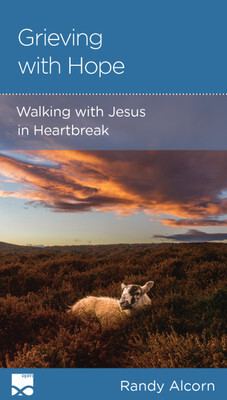 Grieving with Hope
Grieving with Hope  Heaven
Heaven



